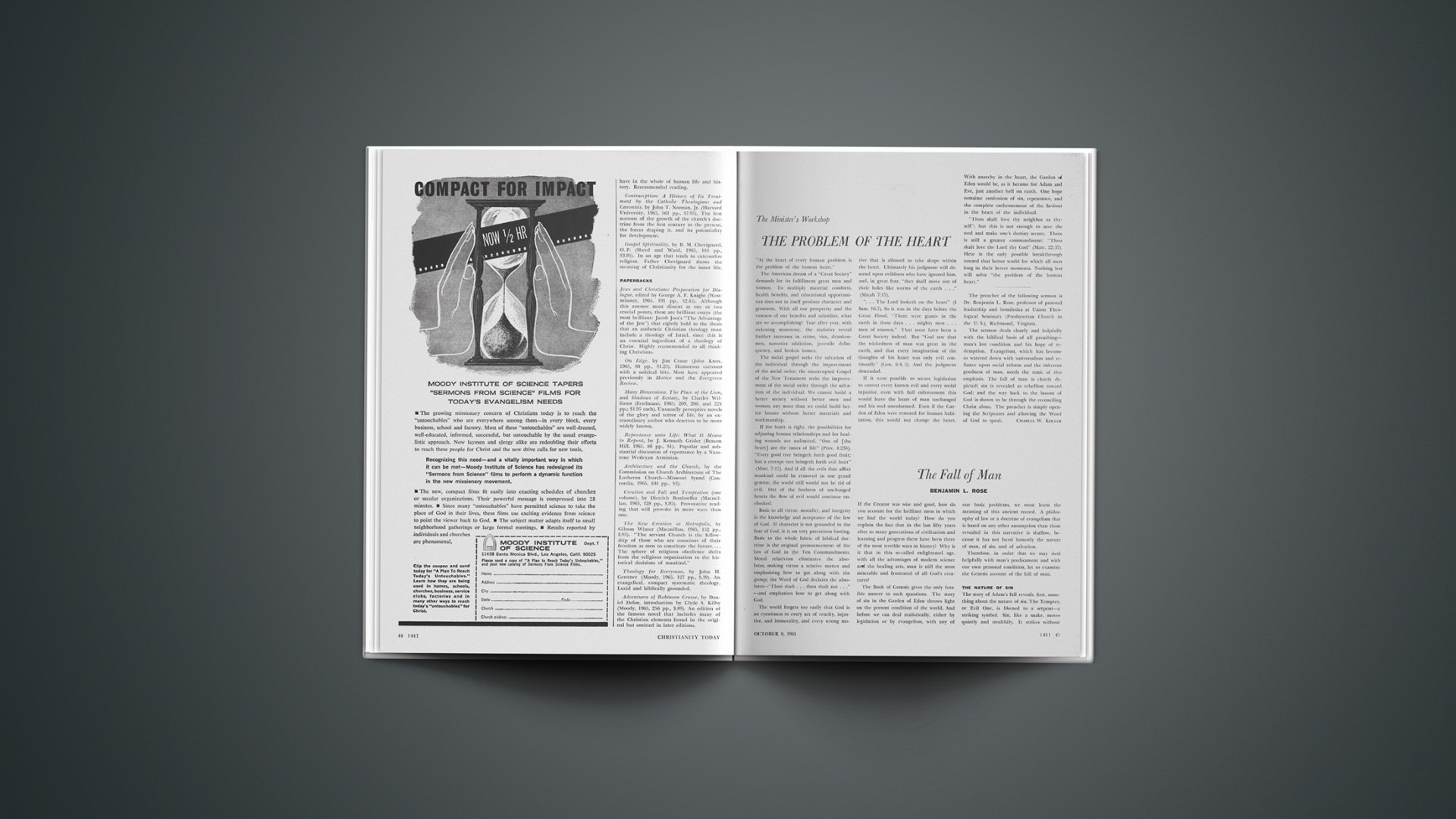“At the heart of every human problem is the problem of the human heart.”
The American dream of a “Great Society” demands for its fulfillment great men and women. To multiply material comforts, health benefits, and educational opportunities does not in itself produce character and greatness. With all our prosperity and the vastness of our benefits and subsidies, what are we accomplishing? Year after year, with sickening monotony, the statistics reveal further increases in crime, vice, drunkenness, narcotics addiction, juvenile delinquency, and broken homes.
The social gospel seeks the salvation of the individual through the improvement of the social order; the uncorrupted Gospel of the New Testament seeks the improvement of the social order through the salvation of the individual. We cannot build a better society without better men and women, any more than we could build better houses without better materials and workmanship.
If the heart is right, the possibilities for adjusting human relationships and for healing wounds are unlimited. “Out of [the heart] are the issues of life” (Prov. 4:23b). “Every good tree bringeth forth good fruit; but a corrupt tree bringeth forth evil fruit” (Matt. 7:17). And if all the evils that afflict mankind could be removed in one grand gesture, the world still would not be rid of evil. Out of the foulness of unchanged hearts the flow of evil would continue unchecked.
Basic to all virtue, morality, and integrity is the knowledge and acceptance of the law of God. If character is not grounded in the fear of God, it is on very precarious footing. Basic to the whole fabric of biblical doctrine is the original pronouncement of the law of God in the Ten Commandments. Moral relativism eliminates the absolutes, making virtue a relative matter and emphasizing how to get along with the group; the Word of God declares the absolutes—“Thou shalt … thou shall not …”—and emphasizes how to get along with God.
The world forgets too easily that God is an eyewitness to every act of cruelty, injustice, and immorality, and every wrong motive that is allowed to take shape within the heart. Ultimately his judgment will descend upon evildoers who have ignored him, and, in great fear, “they shall move out of their holes like worms of the earth …” (Micah 7:17).
“… The Lord looketh on the heart” (1 Sam. 16:7). So it was in the days before the Great Flood. “There were giants in the earth in those days … mighty men … men of renown.” That must have been a Great Society indeed. But “God saw that the wickedness of man was great in the earth, and that every imagination of the thoughts of his heart was only evil continually” (Gen. 6:4, 5). And the judgment descended.
If it were possible to secure legislation to correct every known evil and every social injustice, even with full enforcement this would leave the heart of man unchanged and his soul unredeemed. Even if the Garden of Eden were restored for human habitation, this would not change the heart. With anarchy in the heart, the Garden of Eden would be, as it became for Adam and Eve, just another hell on earth. One hope remains: confession of sin, repentance, and the complete enthronement of the Saviour in the heart of the individual.
“Thou shalt love thy neighbor as thyself”; but this is not enough to save the soul and make one’s destiny secure. There is still a greater commandment: “Thou shalt love the Lord thy God” (Matt. 22:37). Here is the only possible breakthrough toward that better world for which all men long in their better moments. Nothing less will solve “the problem of the human heart.”
The preacher of the following sermon is Dr. Benjamin L. Rose, professor of pastoral leadership and homiletics at Union Theological Seminary (Presbyterian Church in the U. S.), Richmond, Virginia.
The sermon deals clearly and helpfully with the biblical basis of all preaching—man’s lost condition and his hope of redemption. Evangelism, which has become so watered down with universalism and reliance upon social reform and the inherent goodness of man, needs the tonic of this emphasis. The fall of man is clearly depicted; sin is revealed as rebellion toward God; and the way back to the bosom of God is shown to be through the reconciling Christ alone. The preacher is simply opening the Scriptures and allowing the Word of God to speak.










